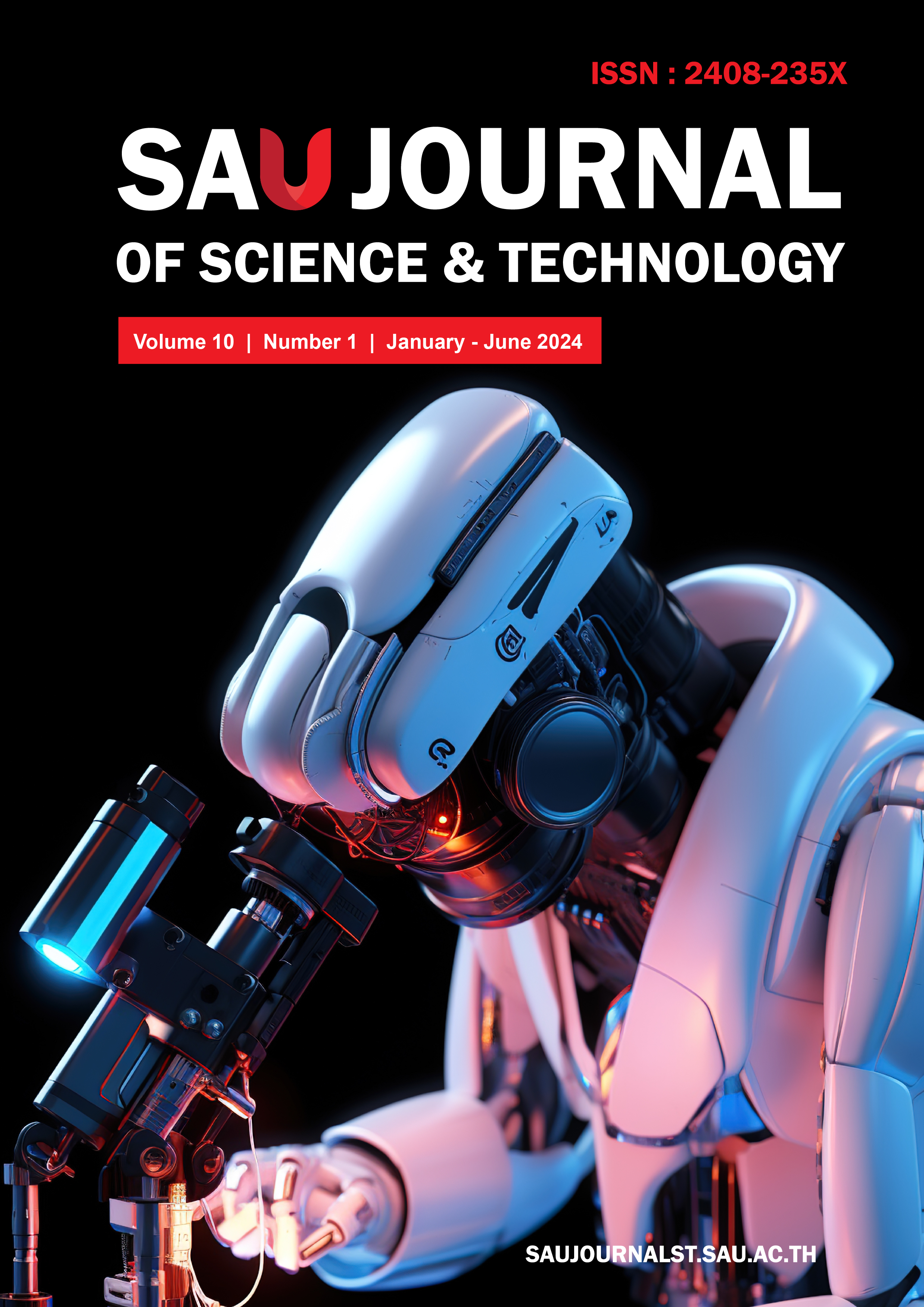Isolating hydrogen from water for diesel engine
Main Article Content
บทคัดย่อ
This paper focuses on designing a hydrogen separator for water and developing a hydrogen production and distribution system for a 4-stroke Compression Ignition Engine (CIE) with a displacement of 2,500 cc and a constant engine speed of 1,100, 1,300, 1,500, and 1,700 RPM. STL 316L stainless steel sheets are used for both the hydrogen water separator and control tools. Each of the 3 channels consists of 3 sets, totaling 42 sheets with 14 poles, including 7 negative and 7 positive poles. The efficiency of hydrogen gas separation from water is measured, revealing that 1,100 RPM results in the highest fuel consumption rate. The average consumption rate of mixed hydrogen gas is 226 CC/min, compared to 325 CC/min for diesel fuel, resulting in a fuel savings of 99 CC/min. In comparison to the electricity used, the highest electric current is 14 A, with an average power of 163 W for electricity at a DC voltage of 12 V. The tests demonstrate that the engine utilizes the least amount of power (146.41 W) and consumes the least amount of fuel (99 CC/min) at 1,100 RPM. Based on these findings, it is determined that utilizing a hydrogen gas separation system from water mixed with diesel fuel could result in a 40% fuel savings.
Article Details
เอกสารอ้างอิง
Energy Policy and Planning Office, Ministry of Energy, "The use of diesel fuel,"Available: (https://www.eppo.go.th).
H. Turan Arat, "Alternative fuelled hybrid electric vehicle (AF-HEV) with hydrogen enriched internal combustion engine," *International Journal of Hydrogen Energy*, vol. 44, no. 34, pp. 19005-19016, Jul. 12, 2019.
Wu Horng-Wen, Hsu Tzu -Ting, Fan Chen-ming, He Po-Hsien, "Reduction of smoke, PM2.5, and NOx of a diesel engine integrated with methanol steam reformer recovering waste heat and cooled EGR," *Energy Conversion and Management*, vol. 172, pp. 567-578, 2018.
SunYao, Yua Xiumin, Donga Wei, Tang Yang, "Effects of hydrogen direct injection on engine stability and optimization of control parameters for a combined injection engine," *International Journal of Hydrogen Energy*, pp. 1-11, 2018.
N. Castro, M. Toledo, and G. Amador, "An experimental investigation of the performance and emissions of a hydrogen-diesel dual fuel compression ignition internal combustion engine," *Applied Thermal Engineering*, pp. 660-667, 2019.
I. Avrahami, N. Shualb, M. Sasson, Y. Nager, O. Dahan, I. Dayee, et al., "Hydrogen production on-demand by hydride salt and water two-phase generator," *Hydrogen Energy*, vol. 45, pp. 15270-15280, 2020.
J. Kotowicz et al., "Hydrogen generator characteristics for storage of renewably-generated energy," *Energy*, vol. 118, pp. 156-171, 2017.
I. Avrahami et al., "Hydrogen production on-demand by hydride salt and water two-phase generator," *Hydrogen Energy*, vol. 45, pp. 15270-15280, 2020.
R. Li et al., "Improving the combustion efficiency of diesel fuel and lowering PM2.5 using palygorskite-based nanocomposite and removing Cd2+ by the residue," *Applied Clay Science*, vol. 162, pp. 276-287, 2018.
Groups of Transportation Statistics, Planning Division, Department of Land Transport Thailand, "Registered vehicle (accumulated) by fuel type as of September 30, 2022," [Online]. Available: (https://web.dlt.go.th/statistics/).


